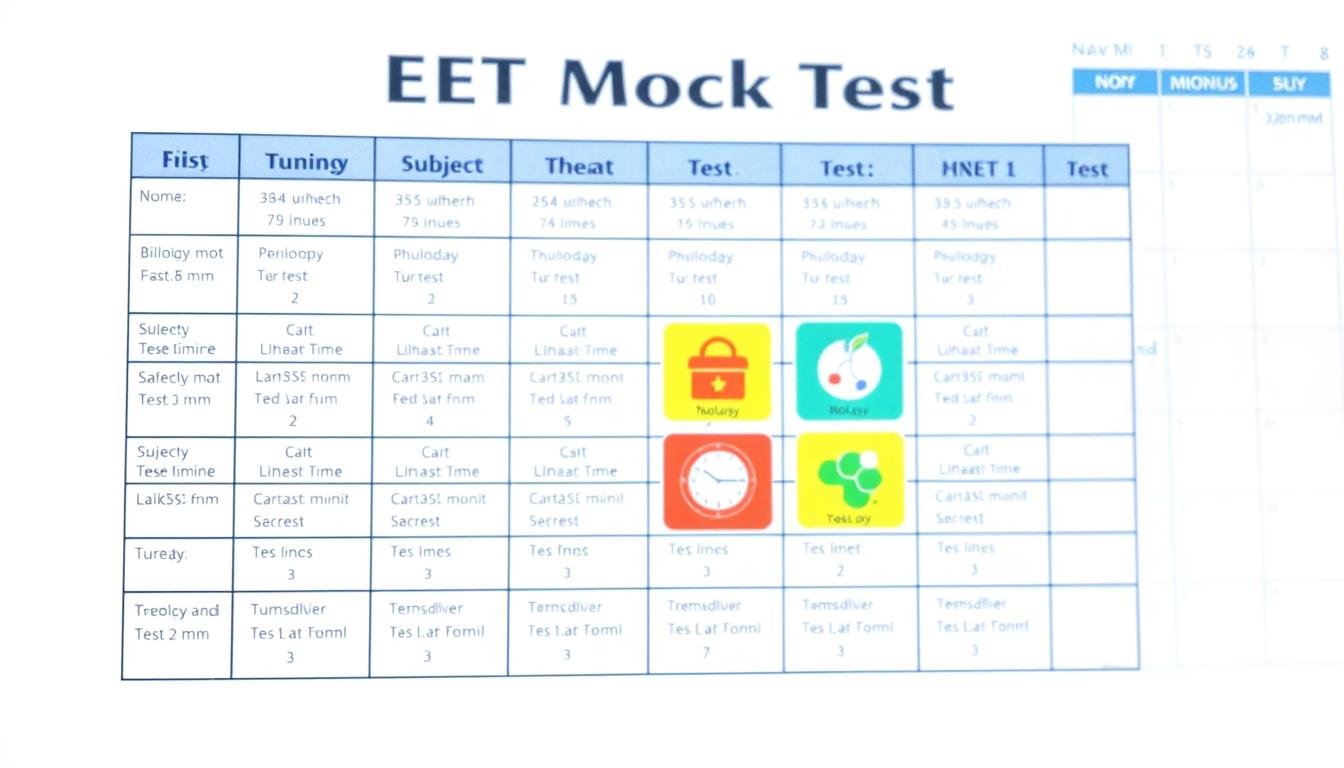Have you ever wondered why some students excel in their exams while others struggle to keep up? The secret often lies in having a well-structured study plan. For those preparing for competitive exams, a clear and detailed approach can make all the difference.
We believe that success comes from careful planning and consistent effort. That’s why we’ve created a comprehensive guide to help you design a weekly study schedule tailored to your needs. This approach ensures you cover all essential topics while tracking your progress effectively.
Our expert template focuses on time management, subject prioritization, and regular assessments. By following this plan, you’ll be better prepared to tackle the challenges of your exam. Let’s dive into how you can create a schedule that works for you.
Introduction to NEET Mock Test Scheduling
What separates top performers from the rest in competitive exams? The answer often lies in a structured approach to learning. For aspirants aiming to excel, a well-planned schedule is not just helpful—it’s essential.
Why a Structured Schedule is Essential for NEET Preparation
A clear plan ensures that every topic is covered systematically. Without it, candidates risk missing crucial areas or feeling overwhelmed. Regular participation in test series helps build confidence and highlights knowledge gaps that need attention.
Our Approach to a Comprehensive Study Plan
We combine online mock tests with offline practices to create a balanced preparation strategy. This dual approach ensures that candidates are well-prepared for both digital and traditional exam formats. A systematic plan not only optimizes learning but also reduces stress, making the journey smoother.
Adopting expert-curated test series and strategies tailored for NEET preparation can make a significant difference. These resources are designed to help candidates focus on their strengths while addressing weaknesses effectively.
Understanding the NEET Exam Pattern and Syllabus
Understanding the NEET exam pattern is the first step toward effective preparation. The exam structure and syllabus are designed to test your knowledge across key subjects. A clear grasp of these elements can help you focus your efforts and maximize your performance.
Overview of Subjects and Topics
The NEET exam covers three main subjects: Physics, Chemistry, and Biology. Each subject is divided into specific topics that are crucial for your preparation. Here’s a quick breakdown:
- Physics: 45 questions covering topics like Mechanics, Thermodynamics, and Optics.
- Chemistry: 45 questions with a focus on Organic, Inorganic, and Physical Chemistry.
- Biology: 90 questions, split between Botany and Zoology, emphasizing concepts like Genetics and Ecology.
This distribution ensures a balanced assessment of your knowledge across all areas. For more tips on effective time management, check out our detailed guide.
Key Changes in the Current Exam Pattern
The NEET 2025 exam introduces some significant updates. Unlike previous years, there are no optional questions, and all 180 questions are mandatory. Each correct answer awards 4 marks, while incorrect answers deduct 1 mark. This marking scheme emphasizes accuracy and careful answering.
Additionally, the exam duration remains 3 hours, with a recommended time allocation of 45 minutes for Physics and Chemistry, and 90 minutes for Biology. These changes highlight the need for a dynamic approach to your study and test-taking strategies.
Planning Your Weekly Routine
A well-planned weekly routine can transform your preparation journey, making it more efficient and less stressful. By organizing your study sessions and practice tests, you can ensure consistent progress while maintaining a healthy balance.
Effective Time Management Strategies
Time management is the cornerstone of a successful study plan. Start by dividing your day into focused blocks for each subject. Allocate specific hours for learning new concepts and revising previously covered topics.
Here are some proven strategies:
- Use a timer to stay on track during study sessions.
- Prioritize challenging topics during your peak productivity hours.
- Incorporate short breaks to avoid burnout and maintain focus.
By following these methods, you can optimize your study time and improve retention.
Balancing Study Sessions with Practice Tests
Balancing learning with self-assessment is crucial. Dedicate specific days to practice tests to evaluate your understanding and identify areas for improvement. This approach helps build confidence and enhances your problem-solving skills.
For example, you can follow this weekly plan:
| Day | Morning | Afternoon | Evening |
|---|---|---|---|
| Monday | Physics (3 hours) | Chemistry (2 hours) | Practice Test (1 hour) |
| Tuesday | Biology (3 hours) | Physics (2 hours) | Revision (1 hour) |
| Wednesday | Chemistry (3 hours) | Biology (2 hours) | Practice Test (1 hour) |
| Thursday | Physics (3 hours) | Chemistry (2 hours) | Revision (1 hour) |
| Friday | Biology (3 hours) | Physics (2 hours) | Practice Test (1 hour) |
| Saturday | Full-Length Test (3 hours) | Analysis (2 hours) | Relaxation (1 hour) |
| Sunday | Revision (3 hours) | Weak Areas (2 hours) | Relaxation (1 hour) |
This structured approach ensures you cover all subjects while dedicating time to practice and self-assessment.
Remember, disciplined time allocation is key to achieving your goals. By sticking to your plan, you’ll be well-prepared and confident on exam day.
Incorporating Both Online and Offline Test Series
Balancing online and offline resources can significantly enhance your preparation strategy. Both formats offer unique benefits, and combining them ensures a well-rounded approach. Let’s explore how these methods can work together to maximize your performance.
Insights from Allen’s DLP and Related Test Series
Allen’s DLP (Distance Learning Program) is designed to cover the complete syllabus systematically. Their test series includes over 150 offline and online tests, ensuring thorough preparation. These series focus on real exam conditions, helping students manage time effectively.
Key features of Allen’s DLP include:
- Comprehensive coverage of all topics.
- Instant doubt resolution with expert faculty.
- Detailed result analysis to identify strengths and weaknesses.
Features of Adda247’s NEET Mock Test Offerings
Adda247 provides a robust platform for digital test series. Their offerings include detailed analysis reports, which help students target specific areas for improvement. With over 25,000 questions, their series ensures extensive practice.
Adda247’s standout features are:
- Flexible online testing options.
- In-depth performance metrics for every student.
- Regular updates to align with the latest exam trends.
Paper-based testing, like Allen’s offline series, mimics the actual exam environment. This format trains students to manage time and answer accurately under pressure. Results are communicated transparently, providing clear insights into performance.
Effective participation in test series is crucial for tracking progress. By combining online and offline methods, you can achieve meaningful results and stay confident throughout your preparation journey.
Step-by-Step Guide to Creating a neet mock test schedule
Crafting a structured plan for your preparation can significantly boost your confidence and performance. A clear roadmap ensures you cover all essential topics while identifying areas for improvement. Let’s explore how to design a schedule that works for you.
Selecting Your Tools and Resources
Choosing the right tools is the first step. Look for platforms that offer detailed question analysis and performance tracking. These features help you understand your strengths and weaknesses, allowing for targeted practice.
Here’s a comparison of popular resources:
| Platform | Features | Benefits |
|---|---|---|
| DSAT | Detailed analytics, customizable tests | Helps identify weak areas |
| Adda247 | Flexible online testing, performance metrics | Aligns with latest exam trends |
| Allen’s DLP | Offline and online tests, expert feedback | Mimics real exam conditions |
Implementing a Daily Practice Routine
Integrating question analysis and solutions into your daily routine is crucial. Start by reviewing incorrect answers to understand the underlying concepts. Use model solutions to learn the correct approach and apply it in future practice sessions.
Here’s a simple daily plan:
- Morning: Focus on challenging topics.
- Afternoon: Take a timed practice test.
- Evening: Analyze results and revise weak areas.
Understanding the exam pattern is key to tailoring your practice. Allocate time based on the weightage of each subject. For example, dedicate more time to Biology if it’s your weaker area. This approach ensures balanced preparation.
By following these steps, you’ll create a schedule that maximizes your efficiency and keeps you on track. Consistency and analysis are the pillars of success.
Using a Test Schedule Template Effectively
A well-designed template can be a game-changer for your study routine. It helps you organize your time, prioritize tasks, and stay consistent. By tailoring it to your needs, you can ensure all areas of the syllabus are covered systematically.
Customizing the Template to Suit Individual Needs
Every student has unique strengths and weaknesses. Start by identifying the areas where you need more focus. Allocate extra time to these subjects while maintaining a balance with others. For example, if Biology is your strong area, spend more time on Physics or Chemistry.
Adjust the template to match your daily routine. If you’re more productive in the morning, schedule challenging topics then. Use evenings for revision or lighter tasks. This flexibility ensures you stay motivated and efficient.
Tips for Maximizing Productivity and Performance
Effective time management is key to success. Break your study sessions into smaller chunks, like 45-60 minutes, with short breaks in between. This approach keeps your mind fresh and improves retention.
Regularly review your progress and adjust the template as needed. If you find a particular area challenging, dedicate more time to it. Use management skills to track your performance and stay on schedule.
Lastly, don’t forget to include time for practice tests and self-assessment. These activities help you gauge your understanding and identify areas for improvement. By following these tips, you’ll maximize your productivity and achieve your goals.
Integrating Detailed Analytics and Feedback
How can detailed analytics transform your preparation strategy? By providing insights into your performance, analytics help you identify strengths and weaknesses. This data-driven approach ensures you focus on areas that need improvement while reinforcing what you already know.
Analyzing Test Results to Identify Strengths and Weaknesses
Platforms like DSAT gather data from your test performance to highlight key areas. For example, they analyze correct, incorrect, and skipped questions to pinpoint topics that require more attention. Understanding the difficulty level of each test also helps you target your study efforts effectively.
Features such as real-time progress tracking and predictive analysis are invaluable. They allow you to set realistic goals and measure incremental improvements. By using data from previous year examinations as benchmarks, you can track your progress and stay motivated.
Utilizing Performance Metrics for Continuous Improvement
Performance metrics provide a clear picture of your strengths and weaknesses. They help you create a customized study plan that prioritizes challenging topics. Regular feedback ensures you fine-tune your preparation strategy and improve accuracy over time.
Here are some key benefits of using analytics:
- Quick identification of weak areas for targeted practice.
- Personalized recommendations based on adaptive algorithms.
- Gamification elements like badges to maintain engagement.
By integrating detailed analytics and feedback into your routine, you can optimize your preparation and achieve your goals with confidence.
Leveraging Expert Faculty and Guidance
What role does expert guidance play in achieving academic excellence? Learning from experienced educators can significantly enhance your preparation strategy. Their insights and mentorship help you tackle challenging subjects like chemistry and physics with confidence.
Gaining Insights from Top Educators
Top coaching institutions like ALLEN provide structured mentorship programs. Their faculty focuses on clarifying complex concepts in subjects like chemistry and physics. Interactive sessions and one-on-one doubt-clearing ensure students grasp even the most challenging topics.
Here’s how expert guidance benefits your preparation:
- Personalized feedback to address individual weaknesses.
- Strategies to manage time effectively during study sessions.
- Regular assessments to track progress and improve performance.
Boosting Performance Through Expert Strategies
Expert faculty use targeted management techniques to optimize your study plan. For example, they recommend allocating more time to subjects like physics or chemistry based on your performance. This approach ensures balanced preparation and maximizes efficiency.
Interactive quizzes and live classes further enhance learning. These sessions not only clarify doubts but also keep students engaged. By following expert advice, you can achieve significant improvements in your academic performance.
Institutions like ALLEN also provide access to high-quality study materials and practice tests. These resources, combined with expert guidance, create a comprehensive preparation strategy. Leveraging such support can make a real difference in your journey toward success.
Adjusting Your Strategy Based on Mock Test Performance
How can actionable insights from practice results shape your study approach? Analyzing your performance is key to refining your preparation. By identifying strengths and weaknesses, you can tailor your methods for better results.
Fine-Tuning Study Methods Based on Feedback
Feedback from practice sessions provides valuable insights. Platforms like DSAT offer detailed analytics to help you understand your performance. Use this data to adjust your study techniques and focus on areas needing improvement.
For example, if you struggle with biology, consider alternative learning methods. Watching expert-led videos or joining interactive sessions can enhance your understanding. Building these skills ensures you tackle challenging topics effectively.
Revamping Time Allocation for Tougher Subjects
Time management plays a crucial role in preparation. Allocate more hours to subjects like biology if they are your weak areas. A dynamic schedule ensures you cover all topics without feeling overwhelmed.
Here’s a comparison of study methods based on feedback:
| Subject | Current Method | Adjusted Method |
|---|---|---|
| Biology | Reading textbooks | Interactive quizzes and expert-led sessions |
| Physics | Solving practice problems | Focusing on conceptual understanding |
| Chemistry | Memorizing reactions | Applying concepts to real-world scenarios |
By fine-tuning your approach, you can achieve significant improvements.
Remember, adapting your strategy based on feedback is essential. It helps you build the necessary skills and confidence to excel in your exams.
Real-Time Updates and Template Adaptations
Staying updated with exam trends can significantly enhance your preparation strategy. Real-time updates ensure your study plan remains aligned with the latest changes. This approach helps you stay ahead and adapt quickly to new patterns.
Monitoring Changes in Exam Trends
Regular updates on exam trends are essential for effective preparation. Platforms like NTA and educational websites provide notifications on changes in patterns and scoring systems. By incorporating these updates, you can refine your approach and focus on key aspects.
For example, recent updates emphasize accuracy in answering questions. Understanding these changes ensures you allocate time wisely and avoid common pitfalls. Staying informed helps you maintain a competitive edge.
Adapting Templates to New Scoring Patterns
As exam trends evolve, your study template should adapt accordingly. Here’s a comparison of traditional and adaptive study approaches:
| Aspect | Traditional Approach | Adaptive Approach |
|---|---|---|
| Focus | Fixed topics | Dynamic topics based on trends |
| Time Allocation | Equal time for all subjects | More time for weaker areas |
| Scoring Strategy | General practice | Targeted practice for accuracy |
Tracking your score over time helps identify areas for improvement. Regular analysis ensures your preparation remains focused and effective. By adapting your template, you can maximize your performance and achieve better results.
Practical Tips for Flexibility and Structure
Balancing flexibility and structure is key to success. Here are some practical tips:
- Review official notifications regularly for updates.
- Adjust your study plan based on performance metrics.
- Allocate more time to challenging topics.
By following these methods, you can ensure your preparation remains aligned with exam demands. Staying updated and adaptable is the key to achieving your goals.
Conclusion
Success in competitive exams often hinges on a well-structured approach. Throughout this article, we’ve explored strategies and tools to create an effective preparation plan tailored for aspirants in India. A smart, data-driven method, combined with expert guidance, can significantly enhance your performance.
Analyzing question papers and leveraging insights from various resources ensures you address weak areas effectively. Structured preparation not only builds confidence but also helps you manage time efficiently during the exam. For the latest updates on the NEET-UG 2025 exam updates, stay informed to adapt your strategy accordingly.
We remain committed to providing practical, expert-backed solutions to help every aspirant excel. With dedication and the right approach, achieving your goals is within reach.





